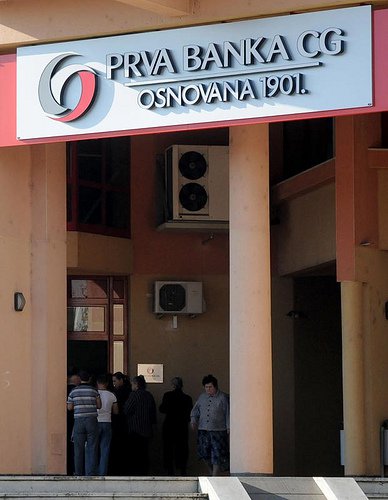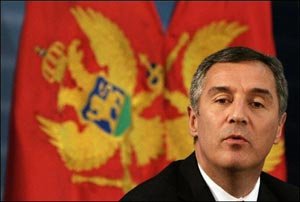Last week the European Union announced that formal accession talks with Montenegro can begin. The process is expected to take years, and with good reason.
Montenegro is the third former Yugoslav republic to enter this stage, after Slovenia and Croatia, which will enter the 27-member union a year from now.
The official decision came with strong caveats that the country of 630,000 must tackle organized crime and corruption. In a deviation from previous procedure, EU negotiators decided to begin accession requirements with the most demanding chapters of the acquis, which governs accession, 23 and 24, on the judiciary, organized crime and corruption, rather than the customary science and culture chapters. EUROPOL, the European Police Agency, will for the first time file regular reports on organized crime in the country.
But real progress on these benchmarks will not come without a shift in the regime that has led the country since the tumultuous 1990s through its 2006 independence from rump Yugoslavia and earned it the dubious distinction of being named a “mafia state” in Foreign Affairs magazine earlier this year. It was accompanied in this category by Venezuela, Guinea-Bisseau, Ukraine, Myanmar, and EU member Bulgaria.
Emblematic of corruption endemic at the highest levels of government in Montenegro is the mismanagement of Montenegro’s second largest bank, Prva Banka (First Bank).
A string of privatizations followed in the wake of Montenegro’s 2006 independence. The process was overseen by president and six time Prime Minister Milo Djukanovic. He was part of the group that set the rules and conditions for the privatization of Niksicka Banka, then a small financial institution from his hometown. Shortly thereafter, his brother and sister purchased enough shares to gain a controlling stake in the bank.

Prva Banka. Vijesti/All rights reserved.
Reports from the Central Bank, Montenegro’s financial regulator and a classified audit conducted by PricewaterhouseCoopers obtained by the Organized Crime and Corruption Reporting Project (OCCRP) and BBC Newsnight reveal that the bank leadership consistently mismanaged the bank, despite repeated warnings from the regulator, in lending money to bank shareholders and family friends, employing scant or inconsistent anti-money laundering measures, and even paying more than €4 million for a Madonna concert when the bank didn’t have enough cash in its coffers to meet obligations to its account holders.
Loans worth millions were made to personal friends of Djukanovic and companies they owned. Loans also went to companies connected to Stanko Subotic, who was indicted by the Italian anti-mafia unit and was sentenced in Serbia for abuse of office, and to Darko Saric, a suspected drug smuggler also from Serbia, now on the run.
Djukanovic himself was investigated and indicted by the Italian anti-mafia unit in the southern city of Bari over a cigarette smuggling operation based in Montenegro worth billions. Charges against him were dropped in 2009 because he had diplomatic immunity as head of state.

Milo Djukanovic. Vijesti/All rights reserved.
By mid-2008, First Bank became the second largest bank in the country and held over €100 million of government, municipal and public company funds.
By late 2008 it was bankrupt. It sought a government bailout worth €44 million, one month after the parliament passed a law guaranteeing bank deposits. Current Prime Minister Igor Luksic was serving at the time as finance minister and approved the bailout even though evidence suggests he knew the bank’s likelihood of being able to repay it was slim, according to Montenegrin pro-transparency NGO MANS.
In March 2009, a Central Bank report showed that the bailout had not helped First Bank, had accumulated €75 million in debt, a sum the regulator estimated was growing by half a million euros every day.
Luksic gave First Bank an extension on the repayment, only had to pay €11 million, which was repaid on March 13 through an odd series of transactions: over the course of half an hour, the ministry made 11 transfers worth €1 million each from the state treasury to the bank.
That money was almost simultaneously transferred back to the state account.
During the bailout, the Central Bank and the World Bank continued advocating a government takeover of the bank, Djukanovic allies amended the law to orchestrate his ouster and replaced him with a man who had been in charge of First Bank.
The problems at First Bank prevented Montenegro from accessing low interest World Bank loans and forced the government to pay higher rates with private lenders. In December 2011, the World Bank finally approved a loan worth €59 million.
Luksic still serves as Montenegro’s prime minister. Djukanovic resigned from the premiership in December 2010, when the country was granted EU candidate status, but continues to serve as the president of the country’s leading Democratic Party of Socialists (DPS), leaving him in effective control.
His critics allege that no high-level charges on organized crime and corruption have een brought against perpetrators unless it is politically advantageous to Djukanovic. Charges for illegal construction against the former mayor of coastal resort city Budva were widely believed to be initiated because of political rivalry, with the added benefit of appearing as a crackdown on corruption.
Montenegro and the EU have agreed to include civil society actors as part of the negotiating practice, an encouraging development, because there are several very active anti-corruption and civil society organizations in the country.
Vanja Calovic, who leads Montenegro’s Network for the Affirmation of the NGO Sector (MANS), maintains that no real progress will occur until the current regime steps down or is voted out of office. MANS has been leading protests in Montenegro’s capital Podgorica, some of which have garnered the participation of 20,000 people.
Through a law that allowed individuals and non-governmental organizations to file lawsuits against the government, MANS this week submitted three sets of charges against high level officials for abuse of office in the case of First Bank: Djukanovic, Luksic, and Central Bank governor and former Chairman of the Board of First Bank Radoje Zugic, as well as Aleksandar Damjanovic, deputy chairman of the parliamentary Budget and Finance committee, Zaria Franovic, a former deputy and a member of that committee, and Predrag Drecun, former CEO of First Bank.
They allege that attempts to save First Bank had negative ramifications not only for the ordinary citizens and businesses who had problems withdrawing their money from the bank, but all Montenegrins, who suffered an increase in electricity prices after Montenegro privatized its power company and sold it to A2A. The Italian company began conducting its financial transactions through the bank.
Although the Montenegrin government met the latest EU accession milestone with fanfare including commemorative stamps and cocktail parties, its response to the investigative series is much more telling of its true intentions to harmonize with European standards. Rather than looking into the allegations of misconduct, the Central Bank Governor Radoje Zugic vowed Friday to find out who leaked confidential documents. Other officials bemoaned the damage the stories might do to investor confidence. The state-owned newspaper outlet Pobjeda published a series of critical but unfounded stories about the editor of OCCRP’s series. The bank never denied any of the information presented in the series. A spokesman for the bank simply said that too much time had elapsed to comment.
“The bank does not intend to justify what happened six to seven years ago, because it has overcome those problems,” director of corporate communications Jelena Pavicevic told Atlas TV.
The bank may have overcome its insolvency, but the First Bank affair shows that Montenegro still has a long way to go and a lot to prove until it can join the European Union.
Read more
Get our weekly email
Comments
We encourage anyone to comment, please consult the oD commenting guidelines if you have any questions.